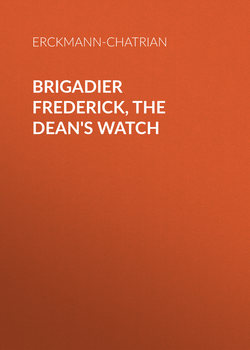Читать книгу Brigadier Frederick, The Dean's Watch - Erckmann-Chatrian - Страница 11
BRIGADIER FREDERICK
IX
ОглавлениеThis took place at the end of the autumn of 1869; the valley was already filled with mist; then came the winter: the snow began to whirl before the panes, the fire to crackle in the furnace, and the spinning-wheel of Marie-Rose to hum from morning till night, to the accompaniment of the monotonous ticking of the old clock.
I paced to and fro, smoking my pipe, and thinking of my retreat. Doubtless Marie-Rose thought of it also, and Merlin spoke to me sometimes about hurrying up the marriage, which annoyed me considerably, for when I have said my say, I am done, and, since we had agreed to celebrate the marriage the day of his nomination, I did not see the use of talking over an affair already decided.
But the young people were in a hurry; the dulness of the season and the impatience of youth were the causes.
For two months past, Baure, Vignerol, Dürr, and the others came no more; the trees bent under their load of icicles; no one passed the house any more, except some rare travellers afar off in the valley. The history of the captain's spies, which had made me laugh so much, had entirely gone out of my head, when an extraordinary thing proved to me clearly that the old soldier had not been wrong in distrusting the Prussians, and that other people thought of dealing foul blows – people high in rank, in whom we had placed all our confidence.
That year several herds of wild boars ravaged the country. These animals scratched up the newly-sown grain; they dug up the ground in the woods to find roots, and came down every night to tear up the fields around the farms and the hamlets.
The peasants were never done lamenting and complaining; when, finally, we heard that Baron Pichard had arrived to organize a general battle. I received at the same time the order to go and join him, at his rendezvous of Rothfelz, with the best marksmen of the brigade, as many of the huntsmen of the neighbourhood as I could get.
It was in December I started with Merlin, big Kern, Donadieu, Trompette, and fifteen or twenty hunters, and in the evening we found up there all the baron's guests, filling the rooms of the little hunting lodge, lying on straw, eating, drinking, and joking as usual.
But you know all about those things, George; you remember also the hunting lodge at Rothfelz, the cries of the hunters, the barking of the dogs, and the danger of the guests, who fired in every direction but the right one, in the lines and out of the lines, always imagining at the end that they had killed the great beast. As for us guards, we had always missed. You remember that; it is always the same thing.
What I want to tell you is, that after the hunt, in which some wild boars and a few young pigs had fallen, they had a grand feast in the hunting lodge. The carriages of the baron had contained an abundance of everything: wine, cherry brandy, wheaten bread, pies, sugar, coffee, cognac; and, naturally, towards midnight, after having run around in the snow, eaten, drunk, howled and sung, the party of pleasure wore a dubious aspect.
We were quartered in the kitchen and well supplied with everything, and, as the door of the dining-room was open, to air the room, we could hear everything that the guests said, particularly as they shouted at the tops of their voices, like blind men.
I had noticed among the number a tall, lean fellow, with a hooked nose, black eyes, a small mustache, a tightly-fitting vest, and muscular legs in his high leather gaiters, who handled his small gun with singular skill; I said to myself, "That man, Frederick, is not in the habit of sitting before a desk and toasting his calves by the fire; he is certainly a soldier, a superior officer!"
He had been stationed near me in the morning, and I had noticed that his two shots had not missed their mark. I looked upon him as a real huntsman, and so he was. He knew also how to drink, for towards midnight three-fourths of the guests were already fast asleep in all the corners, and, except himself, Baron Pichard, M. Tubingue, one of the largest, richest vine-growers in Alsace; M. Jean Claude Ruppert, the notary, who could drink two days running without changing colour or saying one word quicker than another; and M. Mouchica, the wood-merchant, whose custom it is to intoxicate every one with whom he has any dealings – except these, the other guests, extended on their bundles of straw, had all left the party.
Then a loud conversation took place; the baron said that the Germans were sending spies into Alsace, that they had agents everywhere, disguised as servants or commercial travellers or peddlers; that they were drawing out maps of the roads, the paths, the forests; that they even penetrated into our arsenals and sent notes regularly to Germany; that they had done the same thing in Schleswig-Holstein before commencing the war, and then in Bohemia, before Sadowa; that they were not to be trusted, etc.
